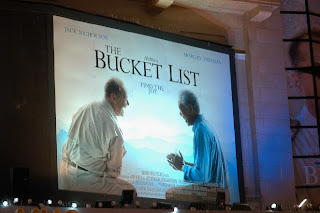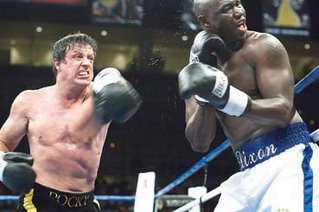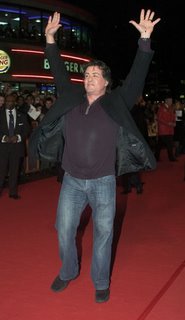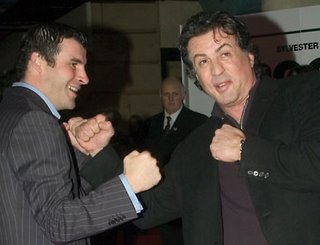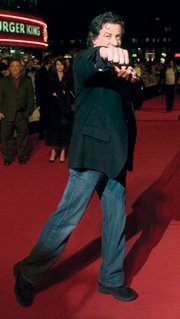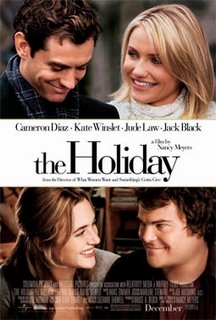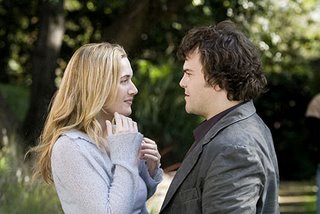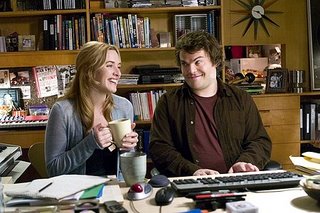DM MEETS JOE & ENZO CALZAGHE
Local Hero Returns for WBC's
'Night of the Champions'
by David Mahmoudieh
Mention the words ‘boxing’ and ‘Bedford’ in the same sentence and it’s likely the name Matt Skelton would be the first that leapt from most lips. But the ‘Bedford Bear’ isn’t alone in carrying the hopes and expectations of a small-town on the big stage. No, there’s another less-celebrated, even if just as pertinent, source of local pride to Bedfordians – as a privileged minority were to witness first-hand last Friday.
April 27th 2007 and the loop closed full-circle on a local hero’s historical wheel as the antique township of Bedford welcomed back Enzo Calzaghe and son Joe for Night of the Champions – a WBC benefit event in aid of the Keech Cottage Children’s Trust. For a pair renowned for remaining humbly reclusive – particularly the latter – the inauguration of such a rare and expressive appearance began long, long ago:
It was way back in 1952 that Enzo Calzaghe, aged two, arrived with his family from the Italian island of Sardinia before settling in the East Anglian town of Bedford, and remaining there until his mid-teens. Still with family in the area to this day, Enzo’s returns to the maudlin streets that bore his earliest memories had – until last Friday – been severely limited. But then I guess he’s got as good an excuse as any...
40 years on since he left the UK’s Italian capital (Bedford has the highest saturation of Italians by demographic than anywhere else in the country) and the eccentric, fifty-seven years young Enzo is now proud father and full-time trainer to a truly prodigal son, Joe Calzaghe, the undefeated and current Super Middleweight Boxing Champion of the World.
 (Proud father Enzo with son Joe after their career-defining
win over American powerhouse Jeff Lacy in April last year)
(Proud father Enzo with son Joe after their career-defining
win over American powerhouse Jeff Lacy in April last year)
For those of you not overly familiar with boxing or its greats, Joe – a cross-breed of his father’s Italian and mother’s Welsh ancestry – is widely regarded as the finest Super Middleweight Champion in the history of the division and is a man already truly assured of his place in boxing folklore when he gives up the gloves. In most sporting circles the word ‘legend’ is way too often thrown around like a set of loaded dice; all seek its marker, few attain it on merit, but Calzaghe Jnr is a welcome exception and well on his way to consolidating his legacy as the genuine article. Only a handful of title-holders have ever remained champion as long or made anywhere near as many defences (Calzaghe won the title off Chris Eubank in 1997 and has held onto it ever since) and acknowledgment of such a feat was evident in 2006 when Joe earned a nomination for the BBC's Sports Personality of the Year Award.
His larger-than-life father, Enzo, isn’t short of recognition either: Enzo was recently awarded ‘Trainer of the Year’ by the prestigious Ring Magazine (“The Bible of Boxing”), an accolade few Europeans have ever had the honour of receiving, which for Enzo, is the equivalent of being recognized as the World Champion of Trainers. Nurturing world-class brawlers isn’t his only talent. Enzo stems from a family rich in musical tradition and proved so in 1998 when he wrote the England World Cup hit ‘Vindaloo’. Told you he was eccentric!
Crimes against music withstanding, it was Enzo's boxing expertise that were needed when, three weeks prior to his visit to Bedford, Joe fought another Italian, Peter Manfredo Jr, an opponent many of you may recognise from ITV’s The Contender, on 7th April at the Millennium Stadium. Calzaghe Jnr made seemingly easy work of the 20th successful defence of his title in his native Cardiff (which came via an albeit discordant stoppage in the third) and Enzo was grateful to be returning to Bedford on a high, “That’s a 20th title defence now for Joe and an added cause for celebration on which to return to Bedford. This was where I grew up and coming here tonight with Joe, showing him all the areas I grew up in, it was marvellous – especially as we were able to help a charity at the end of it.”
 (Enzo watches on intently while Joe & Peter Manfredo
square up for the cameras at their pre-fight weigh-in)
(Enzo watches on intently while Joe & Peter Manfredo
square up for the cameras at their pre-fight weigh-in)
Both Enzo and Joe, who make very few public appearances outside of the ring, are immensely proud of their Italian roots and Enzo felt right back at home in a town where you can’t turn a corner without hearing the rampant yet affable rambling of a full-throttle Italian debate over the weekend’s Serie A football results. “It’s really strange being back here, everything about the town’s changed but the people are still exactly the same. It really is so amazing to be back. You see, usually the family I have here come up to Wales or wherever Joe’s fighting, so for me to come back here to them for a change is really great”, enthused Enzo.
“I take it you have fond memories of the place?”, I inquired.
“Yeah, yeah! Of course I do – I mean, just being here really starts bringing stuff back”, he said reminiscently with a warm twinkle in his eye. “It’s always nice to go back to a place where you’ve got so many good memories.”
 (Joe with the weight of two world titles on his shoulders
in his beloved Cardiff's Millennium Stadium, the stage
for so many of the fighter's virtuoso victories)
(Joe with the weight of two world titles on his shoulders
in his beloved Cardiff's Millennium Stadium, the stage
for so many of the fighter's virtuoso victories)
Over three-hundred people bought tickets to witness Enzo’s homecoming, with all the proceeds being donated to good causes. The event was masterminded entirely by the WBCME (
http://http://www.wbcme.co.uk//), a charity arm of the WBC’s World Boxing Cares commission who utilize their extensive 163-country fellowship to improve the lives of many of the world’s disadvantaged children.
‘Big Champions supporting Little Champions’ is the call to arms, with current and former World Champions volunteering their time and effort in the form of visits to sick and impoverished children in hospitals, orphanages and youth centers both near and far. The Keech Cottage Children’s Hospice was this particular night’s beneficiary, receiving all profits and on-the-night donations – as well as numerous photos and memorabilia signed by all the big names in attendance.

 (Shades of Ali v Liston as Calzaghe sees off the challenge
of Jeff Lacy in their whirlwind 2006 world title fight)
(Shades of Ali v Liston as Calzaghe sees off the challenge
of Jeff Lacy in their whirlwind 2006 world title fight)
That proved to be a fair few signatures, as Calzaghe father and son weren’t be the only ones on show. Joe’s great friend and one-time opponent Richie Woodhall also attended, along with John H Stracey, both of whom are WBC worldwide ambassadors and regular contributors to the World Boxing Cares program.
Richie, who lost a majority points decision to Joe in 2000, believes the event was especially important to raise the image of boxing and its untiring dedication to supporting good causes. “People have a massive misconception about boxing – and boxers, basically. So when they attend events like this and actually meet boxers and world champions, they all say the same thing, ‘God, he’s actually a decent guy’, and it’s as if they’re almost surprised by that because all they see on the TV is Mr. boxer in the ring, fighting”, explained Richie.
“But to be a champion – and to be a boxer – you’ve got to have a split personality and when that bell goes it’s a place of work, you just go out there to do a job. Look at Joe Calzaghe – the way he was tonight you’d probably guess boxing was the last sport on earth he’d be involved in. But once he gets in that ring he becomes a machine, it’s a job. I think if more boxers did more of this – got involved with local communities and actually got out there to basically meet people, then they (the people) would have a much better view about boxing and boxers in general.”
 (Richie in action against now close-pal Joe in 2000;
Calzaghe went on to win the fight by TKO in the tenth)
(Richie in action against now close-pal Joe in 2000;
Calzaghe went on to win the fight by TKO in the tenth)
Joe Calzaghe was of a similar disposition (see our exclusive interview below for the full transcript) and in all fairness, both have an irrefutable case. Joe, Enzo, Richie and John have all at some point stood at the very peak of their sport’s hierarchal ladder, and some still retain their sturdy foothold there: Joe is arguably the best pound-for-pound fighter in the world; Enzo is considered the world’s best trainer; Richie is a former WBC champion; as too is John H Stracey, not to mention a brief acquaintance of Elvis Presley. Yet they are genuinely four of the nicest, most grounded guys you could ever wish to meet. The only chips on these shoulders are the gashes of stray punches that shot for the moon but still landed amongst the surplus throng of scars which confirm these dauntless warriors have earnt their wisdom through nothing short of cavernously heartfelt duel and gruel.
And so indeed, why should the new breed of theatrical trash-talking pugilists dilute the fine work and sportsmanship displayed by four separate generations of boxing achievement and all other emissaries who’ve given back to the sport which they took from it in equal measure. Certainly, in an age where the perpetual press pendulum swings back and forth from the light and dark landmarks of professional contact sports, it would seem boxing and the WBCME have a mutual dependency way beyond the superficial binds that loosely tie the modern-day love-hate relationship between the boxing faculty and its illumination in the media spotlight.
For further information on upcoming events or details of how you can get involved in supporting the WBCME, please contact David Walker on 07930 507 577 or alternatively email:
davidwalker@wbcme.co.uk
INTERVIEW WITH JOE CALZAGHE
After the event, World Champion Joe Calzaghe was kind enough to donate his time to an exclusive interview where I discovered the Super Middleweight WBO and IBF belt-holder has as big a heart outside the ring as he has inside it.
DM: Firstly, Joe – congratulations on a 20th title defence; was that one of the highlights of your boxing career, selling out a record 35,000 crowd in Wales and retaining your crown in front of your own people?
JC: Yeah, thank you very much. I mean, obviously it was a great night for me and of course fighting in Cardiff was special, fighting in Cardiff is always special, but the occasion and the crowd that night made it all the more better, and so yeah it was an outstanding night in my career so far.
DM: You’re of a mixed heritage – Welsh and, perhaps more significantly tonight, Italian – how much does it mean to be in Bedford, the place where your father grew up and where you have such a large Italian following?
JC: Yeah, it’s great, obviously I know my granddad came over here after the war to Bedford and I know this place has a big Italian community --
DM: -- the largest in Europe outside of Italy, apparently.
JC: Is that right, is it? I didn’t know it was that many but I always knew there was a lot of Italians who live here and obviously my dad was one of those, he lived here as a kid with his family and his brothers and so when I found out World Boxing Cares were holding the event here in Bedford that it would a great opportunity to give something back to a local area my father grew up in. He (Enzo) knows the area as well, lots of memories here for him – so, yeah, it was just a fantastic opportunity to come here for a good cause and speak to so many second-generation Italians like myself.
DM: You make very few public appearances, Joe; aside from your father’s connection with Bedford, what was it about the Keech Cottage children’s charity that drew you down here?
JC: Well, you know, I’ve got kids myself – I’ve got a nine-year old and a twelve-year old and there’s nothing more harrowing or distressing for a parent than having to go through an illness which affects your child. I do some work for the NSPCC too and there’s another charity in Wales called Latch which is a charity for children with cancer – so any charity that affects children is close to my heart and at the end of the day any small thing I can possibly do I will endeavour to. It’s a pleasure for me do so and I really hope tonight is a good evening for the charity, and I’d definitely like to support the charity again in the future.
DM: You got an electric reception here tonight; you’ve clearly secured a loyal fan-base, you’ve unified the WBO and IBF world titles, you’ve reached the milestone of 20 title defences… what’s left for you now in the sport of boxing, what else do you feel you need to achieve before you retire?
JC: Listen, I can fight until I’m forty. I’ve just turned thirty-five, I’m in good shape, still sharp as ever, quick as ever but there’s a fine line in boxing – and that’s knowing when to retire. Very, very few fighters know when to retire. You’ve always got that lure of the pound that keeps dragging you back into fighting when you get beat so I’ll give myself three, four more fights – big fights, that’s all I’m after now, I’m not interested in meaningless fights, I want big fights; Jermain Taylor, Kessler, Bernard Hopkins, Roy Jones – I’m not interested in anything else. I’ve put myself in the big league, all I want to do is fight big fights whether it’s in England, Wales or America – big fights with big money.
DM: As you said, you’re finally getting the recognition in the USA you’ve craved for so craved and deserved arguably even longer – but do you maybe regret that you never got to fight Steve Collins, who was well known in the States, and who may have unlocked the door for you over there a little earlier?
JC: Well, I mean Steve Collins retired at the end of the day, what more can I say? Frank Warren promoted the two of us and you ask Frank Warren what happened – he (Steve Collins) didn’t wanna fight me for a simple reason – he knew he was gonna get beat. He retired six days before the fight, what champion retires six days before a world title fight? And at the end of the day, Chris Eubank was training for a fight as well and Eubank to be honest, you know, he was going through a phase where he was having ten fights a year and he actually knocked down Steve Collins in the first fight, so… But yeah, of course, I would have loved to have beat Steve Collins because he was the actual champion at the time. But still, fighting somebody like Chris Eubank – I mean the guy was practically a legend and if you’re gonna win a world title Chris Eubank’s a big name to win it off.
DM: Speaking of missed opportunities: any fighter, any weight, any era – who would you have loved to face?
JC: Ooh, I don’t know… I would have liked to have tested myself against Hagler, y’know, Hagler was a great fighter, he was a southpaw like myself, very strong, very good hand-speed – I would have liked to see what might have happened between me and Hagler if he had’ve stepped up to Super Middleweight, but I don’t know, it’s difficult to say. There’s so many great fighters, I don’t tend to look at them and think ‘what would I have done against them’ I just like to look back and admire them, like Leonard, Duran, Chavez – all them sort of fighters. I don’t really think about what I’d have done with them I just admire them for the fighters they were in their day.
DM: Boxing as a sport has endured a lot of unnecessary bad press recently, do you think there needs to be more of the type of thing you’ve done tonight; boxers going out of their way for good causes to show that for all the negative attention boxing attracts in the ring, it more than makes up for with positive endeavours outside of it?
JC: Definitely. What boxing doesn’t need is bad press. Boxing needs good press. It doesn’t need fighters who disrespect the sport and slag off other fighters or brawl in the street – and the thing is, when fighters do that, when they actually get in the ring they’re s**t. Y’know, at the end of the day, I do all my talking in the ring and normally you get quiet guys at the press conferences and they’re respectful, then they have wars in the ring. That’s what you want to see, you wanna see a fight in the ring not outside the ring, so definitely it’d be great to get rid of all the bad-mouthing and frolics outside of boxing. But… listen, y’know I still think boxing’s a great game and I love the sport and ultimately it’s made me who I am.
DM: What practical advice would you give to anyone who wanted to get into the sport of boxing?
JC: It’s a great sport, it teaches you discipline, keeps you very fit and gives you a focus in your life. If you learn it properly with a good trainer and you stay dedicated to it then it can take you far in life. There’s many dedicated (boxing) gyms all over the country for all ages and if you want to get involved, go along, see if you like it, even if just to keep fit, and who knows? I guess you never know unless you try.
DM: Thank you very much for your time and thank you for being here tonight, Joe.
JC: Absolute pleasure.
© David Mahmoudieh 2007

